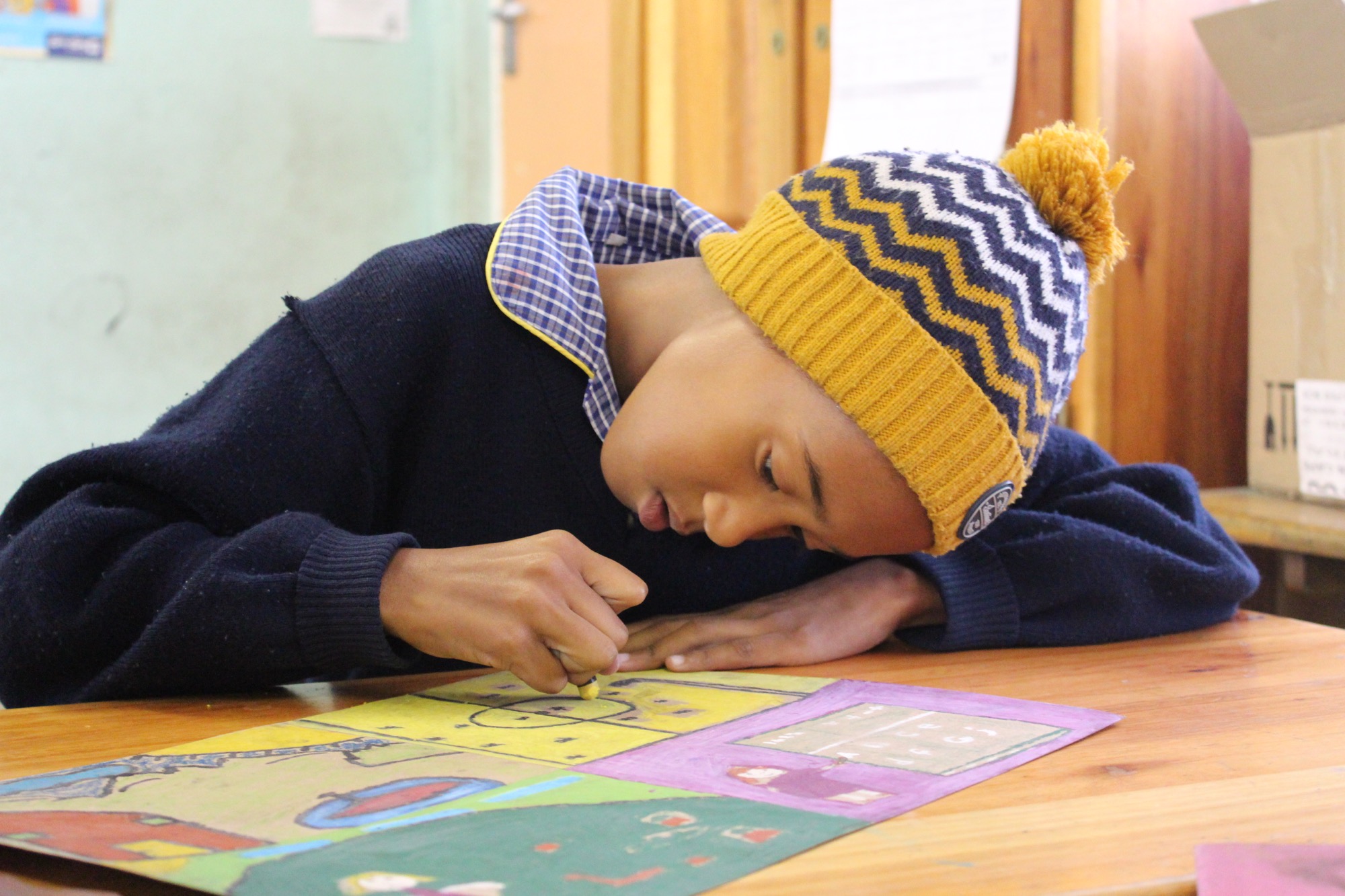Heart Map Social Cohesion Project
January 30, 2020

Recognising the importance of the lack of social cohesion in South Africa generally, and in an attempt to address this in the crucial school-going years, Lalela introduced an innovative methodology known as the Heart Map, which was developed through years of working with children in communities throughout Africa; and giving them a voice through art to share their stories with one another. It allows learners to connect on a meaningful heart-to-heart journey, and is one of Lalela’s key programmes.
Lalela received a National Arts Council (NAC) grant in 2016 to conduct a project on social cohesion through education, focusing on the subjects of Creative Arts (Visual Arts), Life Orientation and Life Skills for grades 6 – 9 at schools in urban centres in all nine of South Africa’s provinces.
Teachers were trained in the implementation of the Heart Map curriculum, which could be integrated into the existing and respective curricula of the Creative Arts subject (the visual arts component), the Life Orientation subject and the Life Skills subject at urban schools nationally. Teachers not only acquired foundational skills for teaching visual art within the Creative Arts classes, but were equipped with the skills to promote social cohesion in the classroom, as well as to become more skilled in general behavioural class management.
The sessions were Curriculum and Assessment Policy Statement (CAPS) aligned, and were approved by the majority of provincial Education Departments, who received a comprehensive breakdown of marks and rubrics for assessments. The NAC training covered one full day, and was delivered free of charge (in the nine provinces, including urban, peri urban and rural districts) for Creative Arts (Visual Art) and Life Orientation teachers for grades 6 – 9. They were provided with the curriculum, lesson plans and a training manual.
Importantly, Lalela was accredited with the South African Council of Educators (SACE), and teachers who attended the trainings qualified for 10 CPTD points.
By the end of the project, 1,358 teachers from 983 schools in all nine provinces of South Africa had been trained. The total number of learners who received (or were due to receive) Heart Maps in their schools was 171,679.
Across all nine provinces, most of the schools that were direct beneficiaries of the programme were no-fee schools, while most of the learners came from marginalised or less privileged backgrounds.
Monitoring, evaluation and learning was conducted by Impact Consulting, an independent organisation. Their evaluations found that:
89% of teachers who were interviewed reported seeing positive changes in learners because of Heart Maps, particularly how they relate to their peers.
61% of teachers interviewed felt that their learners were increasingly socialising with others from different races and/or cultural backgrounds, which in turn was decreasing levels of discrimination in class.
74% of learner respondents in the evaluation process responded that they would behave better towards others because of the project
85% of learner respondents in the evaluation process indicated that will make more friends with people from different cultures because of the programme
72% of learner respondents in the evaluation process indicated that they had changed the way they think about others
79% of learner respondents in the evaluation process said they had learned ‘a lot’ about other people who are different to them
87% of learner respondents in the evaluation process expressed that they had more respect and understanding for their partners after the Heart Map process
73% of learner respondents in the evaluation process stated that they learned something new about themselves.
Additionally, learners, through the written evaluations and focus group discussions, reported that the life skills/soft skills that they had learned from participating in the Heart Maps process were very important. These “skills” included:
- being less judgemental/discriminatory
- accepting others’ differences
- sharing, listening and communication skills
- trust and teamwork/working together
- problem solving skills
- being kinder
- how to self-evaluate
- how to be more open and honest
- the importance of perseverance
- acting more respectfully.
Impact Consulting’s conclusion from its final report on Lalela’s Heart Map Social Cohesion Project read as follows:
“The Heart Map Social Cohesion Project has made its way into classrooms across all nine South African provinces, helping learners to improve their art and positively change their perspectives about themselves and others. The project has afforded young people the experience of sharing and listening – an experience which has been novel for many involved. This experience has, in many instances, shifted their attitudes towards people whom they may have previously seen as different to them and whom they may have previously judged and avoided. The Heart Maps Project has also empowered many young people to think about themselves more positively – and helped them to be more open, communicative and self-confident. This has allowed them to build respect, tolerance and understanding in themselves, thereby breaking down barriers and fostering social cohesion across the country.”
Share this story with a friend...
DONATE TODAY
Your generosity makes it possible for Lalela’s educational arts programmes to create meaningful change that affects thousands of at-risk children in Sub-Saharan Africa.
Your generosity makes it possible for Lalela’s educational arts programmes to create meaningful change that affects thousands of at-risk children in Sub-Saharan Africa.
SUBSCRIBE TO OUR NEWSLETTER
SUBSCRIBE TO OUR NEWSLETTER
